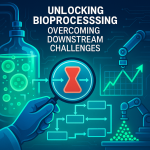Introduction:
NIIMBL, the National Institute for Innovation in Manufacturing Biopharmaceuticals, has announced its latest funding round to support various technology programs and developmental training initiatives in the biopharmaceutical industry. The projects include an intensified viral vector production method, the creation of “surrogate” antibody drug conjugates (ADCs), and the development of process analytical technology (PAT) workflows. The funding aims to accelerate biopharmaceutical innovation, support manufacturing standards, and enhance workforce skills.
- One of the projects selected for support is the integration of ChromaTan’s column-free chromatography platform into Batavia Biosciences’ adeno-associated viral vector (AAV) production system. The collaboration aims to increase processing throughput, recovery during purification, and reduce costs.
- Enquyst Technologies, Lonza, MilliporeSigma, and the University of Massachusetts Lowell received backing to develop the isoelectric point purification (IPP) technique for continuous monoclonal antibody (mAb) production processes.
- Rutgers University, in collaboration with Agilent, Endress + Hauser Optical Analysis, EnZene Biosciences, MilliporeSigma, and Pfizer, will develop process analytical technology (PAT) workflows to monitor critical quality attributes (CQAs) of biological drugs.
- Pfizer, in partnership with Carnegie Mellon University and the Rensselaer Polytechnic Institute, is working on the development of “surrogate” ADCs, which will allow for the assessment of first-generation and second-generation ADCs without the associated toxicity.
- Two training initiatives are also included in the funding round. Santa Clara University, with support from Biocom California, Genentech, and Merck & Co, will create a data analytics program for engineers. Texas A&M University, Janssen, Pfizer, and the University of California, Los Angeles, will develop a course to equip and support neurodivergent talent for the biomanufacturing industry.
Conclusion:
NIIMBL’s funding round supports various bioprocess technology projects and training initiatives aimed at advancing biopharmaceutical manufacturing. The projects range from improving viral vector production and purification processes to developing analytical technologies for monitoring critical quality attributes. The funding aims to accelerate innovation, establish manufacturing standards, and enhance the skills of the biopharmaceutical workforce.



